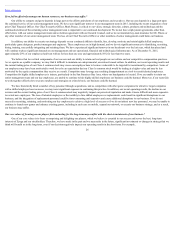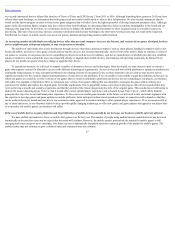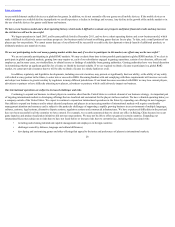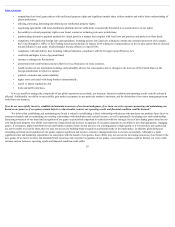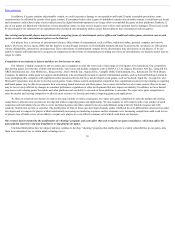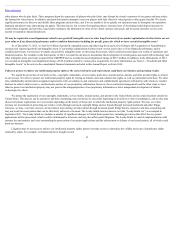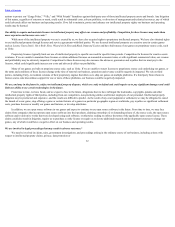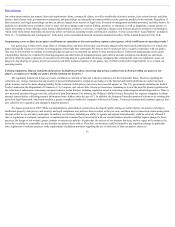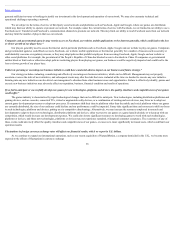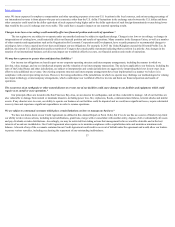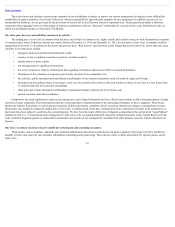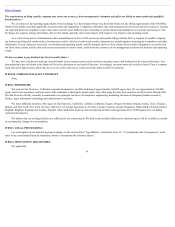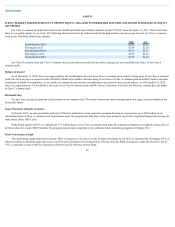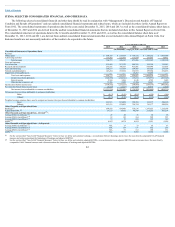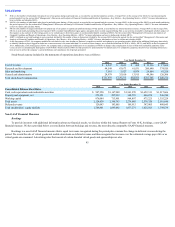Zynga 2015 Annual Report Download - page 39
Download and view the complete annual report
Please find page 39 of the 2015 Zynga annual report below. You can navigate through the pages in the report by either clicking on the pages listed below, or by using the keyword search tool below to find specific information within the annual report.
Table of Contents
generate sufficient revenue or bookings to justify our investment in the development and operation of our network. We may also encounter technical and
operational challenges operating a network.
We are subject to the terms of service of third party social networks and platforms such as Facebook, Apple and Google, where our games are distributed,
which may limit our ability to operate or promote our network. For example, under the current terms of service with Facebook, we are limited in our ability to use a
Facebook users’ friends list and Facebook’s communication channels to promote our network. This may limit our ability to reach Facebook users from our network
and may limit the number of players that use our network.
CompaniesandgovernmentalagenciesmayrestrictaccesstoFacebook,ourwebsite,mobileapplicationsortheInternetgenerally,whichcouldleadtotheloss
orslowergrowthofourplayerbase.*
Our players generally need to access the Internet and in particular platforms such as Facebook, Apple, Google and our website to play our games. Companies
and governmental agencies could block access to Facebook, our website, mobile applications or the Internet generally for a number of reasons such as security or
confidentiality concerns or regulatory reasons, or they may adopt policies that prohibit employees from accessing Facebook, Apple, Google and our website or
other social platforms. For example, the government of the People’s Republic of China has blocked access to Facebook in China. If companies or governmental
entities block or limit such or otherwise adopt policies restricting players from playing our games, our business could be negatively impacted and could lead to the
loss or slower growth of our player base.
Failureinpursuingorexecutingnewbusinessinitiativescouldhaveamaterialadverseimpactonourbusinessandfuturestrategy.*
Our strategy includes evaluating, considering and effectively executing new business initiatives, which can be difficult. Management may not properly
ascertain or assess the risks of new initiatives, and subsequent events may alter the risks that were evaluated at the time we decided to execute any new initiative.
Entering into any new initiatives can also divert our management’s attention from other business issues and opportunities. Failure to effectively identify, pursue and
execute new business initiatives may adversely affect our reputation, business, financial condition and results of operations.
Ifwefailtoanticipateorsuccessfullydevelopnewgamesfornewtechnologies,platformsanddevices,thequality,timelinessandcompetitivenessofourgames
couldsuffer.*
The games industry is characterized by rapid technological changes that can be difficult to anticipate. New technologies, including distribution platforms and
gaming devices, such as consoles, connected TVs, virtual or augmented reality devices, or a combination of existing and new devices, may force us to adapt our
current game development processes or adopt new processes. If consumers shift their time to platforms other than the mobile and social platforms where our games
are currently distributed, the size of our audience could decline and our performance could be impacted. It may take significant time and resources to shift our focus
to such technologies, platforms and devices, putting us at a competitive disadvantage. Alternatively, we may increase the resources employed in research and
development to adapt to these new technologies, distribution platforms and devices, either to preserve our games or a game launch schedule or to keep up with our
competition, which would increase our development expenses. We could also devote significant resources to developing games to work with such technologies,
platforms or devices, and these new technologies, platforms or devices may not experience sustained, widespread consumer acceptance. The occurrence of any of
these events could adversely affect the quality, timelines and competitiveness of our games, or cause us to incur significantly increased costs, which could harm our
operation results.
Fluctuationsinforeigncurrencyexchangerateswillaffectourfinancialresults,whichwereportinU.S.dollars.
As we continue to expand our international operations, such as our recent acquisition of NaturalMotion, a company domiciled in the U.K., we become more
exposed to the effects of fluctuations in currency exchange
36


